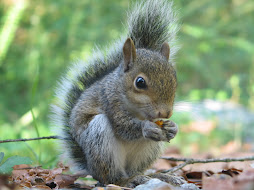Why Are The Hungry Never Fed?
Instead, He spent the majority of His time ministering to the needs of the poor in spirit, the sick, afflicted, hungry souls. In other words, he fed those who were hungry.
So when an Apostle recently visited Sydney, what did he spend a whole day doing? It was spent with the priviledged few, the mighty leaders, the Stake Presidents, the Bishops; those who get fed the most. Those who spend time with an Apostle every single time one visits Sydney.
What about those who were hungry? What about those who have NEVER spent time with an Apostle?
Warn The Squirrel
Portion of a talk "Where Will It Lead?" given by Dallin H. Oaks who is a member of the Quorum of the Twelve Apostles
of The Church of Jesus Christ of Latter-day Saints.
© Intellectual Reserve, Inc. All rights reserved.
"The setting was a beautiful campus in central Illinois. My informant, a participant in a summer workshop, saw a crowd of young students seated on the grass in a large semicircle about 20 feet from one of the large hardwood trees that are so common and so beautiful there. They were watching something at the base of the tree. He turned aside from his walk to see what it was.
There was a handsome tree squirrel with a large, bushy tail playing around the base of the tree—now on the ground, now up and down and around the trunk. But why would that beautiful but familiar sight attract a crowd of students?
Stretched out prone on the grass nearby was an Irish setter. He was the object of the students’ interest, and, though he pretended otherwise, the squirrel was the object of his. Each time the squirrel was momentarily out of sight circling the tree or looking in another direction, the setter would quickly creep forward a few inches and then resume his apparent indifferent posture. Each minute or two he crept closer to the squirrel, and the squirrel apparently did not notice. This was the scene that held the students’ interest. They were silent and immobile, attention riveted on the drama—the probable outcome of which was becoming increasingly obvious.
Finally the setter was close enough to bound at the squirrel and catch it in his mouth. A gasp of horror arose, and the crowd of students surged forward and wrested the beautiful little animal away from the hound, but it was too late. The squirrel was dead.
Anyone in that crowd of students could have warned the squirrel at any time by waving their arms or crying out, but none had done so. They just watched while the inevitable consequence got closer and closer. No one asked “Where will this lead?” and no one wished to interfere. When the predicable outcome occurred, they rushed to the defense, but it was too late. Tearful and regretful expressions were all they could offer.
That true story is a parable of sorts. It has a lesson for things we see in our own lives, in the lives of those around us, and in the events occurring in our cities, states, and nations. In all these areas we can see threats creeping up on things we love, and we cannot afford to be indifferent or quiet. We must be ever vigilant to ask “Where will it lead?” and to sound appropriate warnings or join appropriate preventive efforts while there is still time. Often we cannot prevent the outcome, but we can remove ourselves from the crowd who, by failing to try to intervene, has complicity in the outcome."


